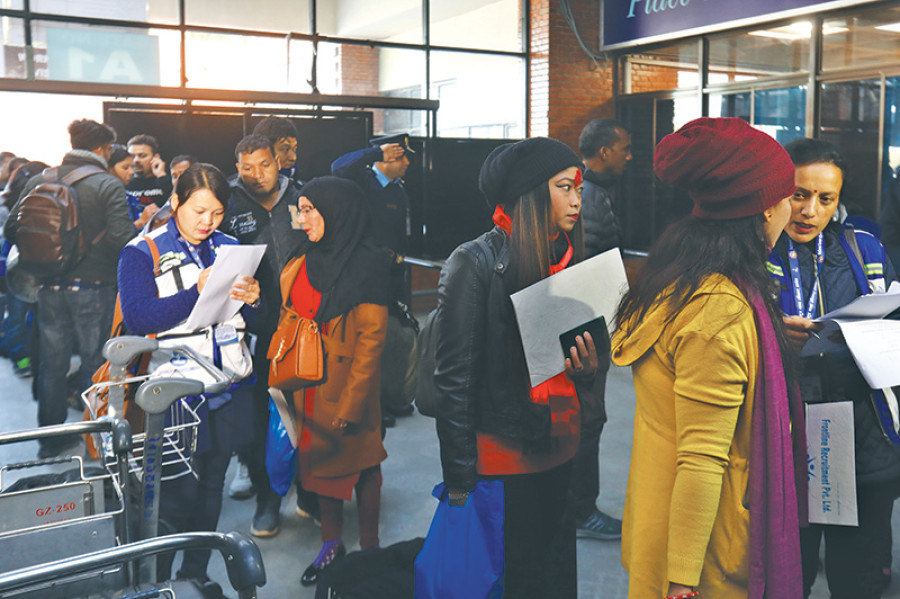National
New rule for under-40 women’s foreign travel draws ire as patriarchal and preposterous
In what is described by members of public and rights defenders as a regressive move, the government says women under 40 years of age must take consent from family to fly abroad on visit visas.
Chandan Kumar Mandal & Samiksha Baral
After flights resumed following months-long suspension due to the Covid-19 pandemic, Kreepa Gurung was making plans to meet with her parents who live abroad.
Now Gurung, 24, who is a freelance art director for short movies, is concerned, as the Nepal government is proposing a new rule that says women under 40 years of age must seek consent from the family–and even the concerned ward office–to travel abroad on a visit visa.
“I was so frustrated to learn about this new rule through the media,” Gurung told the Post. “For about a decade now my grandparents have been living in the United Kingdom and my parents in the United States. I have been travelling there and other parts of the world on my own.”
The new rule, said Gurung, simply is creating restrictions for women in this country.
The government has argued that the new rule is aimed at “protecting” women.
According to Tek Narayan Paudel, a spokesperson with the Department of Immigration, the government has considered adding the new rule for women under 40 years of age travelling on visit visas.
“This is only for women under 40 and leaving the country on a visit visa,” Paudel told the Post. “This girls/women in this age group are at a higher risk of human trafficking and other abuses. The new rule is proposed for their protection from potential abuses.”
But many say the new rule simply reflects the depravity of thought of Nepal’s decision-makers who have made a habit of coming up with such regressive rules.
The move has invited a slew of criticism from members of the general public, women rights defenders and rights activists who say the state is trying to rob women of their agency by curtailing their constitutionally guaranteed right to move freely.
“This is absolutely wrong,” Mohna Ansari, a former National Human Rights Commissioner, told the Post. “Such a move contradicts the constitutional provisions that guarantee equal and fair treatment of all citizens and calls for ending gender-based discrimination.”
This new rule for foreign travels comes on the heels of yet another controversial rule a few weeks ago when the government said all those wishing to fly abroad must have a high-school diploma and should be able to speak English.
Then also, the Department of Immigration had made a similar argument–that the new rules were being introduced to control Nepalis leaving the country on visit visas only to work later.
The move, however, was rescinded after massive criticism.
The Nepali state’s view towards women has never been positive, as the state is by and large controlled by men, according to rights activists. Instead of fulfilling its duty of protecting the citizens, the government has been trying to impose restrictive and regressive rules in the name of protecting them, they say.
Anurag Devkota, a human rights lawyer, called the proposed rule “a blatant attack” on the constitutionally guaranteed right of women and internationally safeguarded right to mobility.
“Regressive moves of this sort send across a negative message to the national and international community,” Devkota, who closely follows the welfare of migrants, told the Post.
Devkota cited Article 15 of the Convention on the Elimination of All Forms of Discrimination against Women (CEDAW) that states parties shall accord to women equality with men before the law.
Article 15 (4) of the CEDAW states that countries shall accord to men and women the same rights with regard to the law relating to the movement of persons and the freedom to choose their residence and domicile.
“Nepal being party to the Convention and by virtue of the Treaty Act of Nepal, this move is beyond the ambit of law, out and out unconstitutional and legally wrong,” said Devkota.
Ansari, the former human rights commissioner, also said if such a rule is enforced, it will be against the constitution that guides the country’s laws and policies.
Government officials say the new change is part of the amendments proposed to the existing Immigration Procedures- 2008 to check the trend of people flying abroad on visit visas to work there and save them from potential abuses.
As per the new rule, the family of the visiting girl/woman and the local ward office has to issue “a recommendation” that she can travel abroad.
The family member will first write a consent letter, saying they are well informed about her trip and the purpose of the trip.
Besides, visitors will be required to buy insurance of minimum Rs1.5 million and carry currency equivalent to US$1,000 as travel expenses.
“To some extent it’s true that Nepali women flying abroad on visit visas have faced troubles later. But such a blanket move contradicts the existing laws that guarantee the right to freedom and movement,” said Sharu Joshi Shrestha, a gender and labour migration expert. “It is true that travelling on visit visas makes women vulnerable to abuse. But authorities should be more concerned about why they have to migrate on a visit visa if the government allows them on an employment visa.”
The latest move also led to many recalling a similar discriminatory provision in the past that had made it difficult for obtaining a passport for women under the age of 35. As per a rule, women were required to take consent of their parents just to get the passport.
Responding to a writ petition filed by two women—Punyabati Pathak and Mana Basnet Karki—the Supreme Court in 2005 had scrapped the decade-old Cabinet decision and directed the government to issue passports to women under 35 years of age even without the consent of their guardians. The court also directed the government authorities not to impose any restrictions on women who want to obtain passports.
Experts like Shrestha point out that the primary focus should be on why women are not allowed to go freely to work abroad.
For several years, the government has adopted a “protectionist approach” of not allowing Nepali women to work abroad, saying they might turn victims to human trafficking and other exploitations. Through a series of bans over the years, the government came up with myriad rules and policies barring women from migrating abroad to seek job opportunities overseas.
Such restrictions, which have been enforced as per age-groups and nature of jobs, have rather forced women to take illegal and unsafe routes.
“The government agencies need to take into consideration how many women they have been able to protect with such bans that have been on and off for the last 20 years,” said Shrestha, who is also the executive board member of Nepal Policy Institute, a think tank. “The state has a responsibility to protect its citizens.”
As soon as reports of the new rule for women under 40 surfaced in the media, there was a deluge of outrage on social media.
“Stop taking decisions for women. The prevalence of patriarchal mindset/madness may allow you to show your misogynist concerns but controlling women just because you're in power is sheer impiety towards the entire gender. You don't speak for us, you can't control us,” wrote a Twitter user.
“When will we begin viewing women as human beings capable of making decisions for themselves in this country?” wrote another on Twitter. “Absolutely preposterous.”
Gurung on her part said the new proposed rule is outrageous and absurd but the tendency of Nepali immigration officials, mostly men, however, has been the same–behaving with women in a condescending way and treating them as second-class citizens.
“Two years ago when I was travelling to Thailand and Singapore, I was interrogated by immigration officials in a very bad way; I felt uncomfortable,” said Gurung. “I knew those questions were being bombarded at me just because I am a woman. I have heard similar experiences from many others.”
The new proposed rule comes also at a time when a large section of society is enraged at the growing number of cases of violence against women. In what came as a grim reminder of a more than two-year-old Nirmala Pant rape and murder case, a 17-year-old girl was found dead on February 4 in a forest in Baitadi district. Police have yet to arrest those involved in the rape and murder of Pant.
Rights activists say Nepali authorities have constantly failed to implement laws and act swiftly in women-related cases, but they show an extreme level of promptitude to introduce laws that not only demean women but reduce them to second-class citizens.
“The new proposed rule is a reflection of how laws in Nepal are made with male-dominated mindset,” said Ansari. “Nepal is receiving a lot of funds for protecting the rights of its citizens, but it seems it is being used for violating their rights.”




 20.78°C Kathmandu
20.78°C Kathmandu














